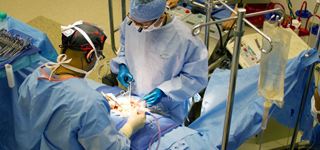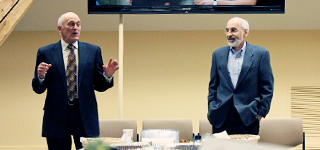Why Do Simulation-Based Training?
Simulation-based training at the Center for Medical Simulation (CMS) gives healthcare providers a new, enlightening perspective on how to handle real-life clinical situations. With high-realism patient care scenarios that closely simulate genuine crises, the CMS experience helps participants develop preparedness to both prevent and respond to critical events. Simulation is poised to help fundamentally change healthcare to meet the challenges of our times. CMS will continue to be in the forefront of those efforts.
Simulation Instructor Training
CMS continues to be an international leader in a field that it helped to develop and grow. In partnership with the Harvard-MIT Division of Health Sciences and Technology, CMS formed The Institute for Medical Simulation (IMS) in 2004. As a part of CMS, IMS offers courses for simulation leaders, educators and researchers who seek to develop and maintain high-quality healthcare simulation programs within their organizations. Those students are CMS’ greatest influence around the world.
Simulation-Based Clinical Training
CMS focuses on developing teamwork behaviors and communication, collaboration and crisis management skills that are best learned experientially under realistic conditions. Since it first opened in 1993 as a collaboration of the Harvard Medical School affiliated hospitals, CMS has conducted courses for thousands of participants using its innovative and challenging scenarios.
Training Highlights
Today, CMS is internationally known for its:
- High realism, multidisciplinary team training for clinicians and instructors
- CMS has an elite team of more than 25 professionals with expertise in medicine, patient safety, biomedical engineering, organizational behavior and adult learning.
- Breadth of high-quality programs in full-environment facilities
- CMS offers innovative courses for clinicians, medical educators, healthcare administrators and managers.
- CMS has the expertise, space and equipment to outfit different clinical settings including an OR, ICU and ED at its Boston, Massachusetts, site in the historic Charlestown Navy Yard.
Comprehensive Approach
All CMS courses address both the clinical and behavioral aspects of performance, focusing on crisis management and error prevention. Course topics include leadership, teamwork, effective communication, resource management and performance enhancement. Active learning in the CMS’ real-world settings enhances participants’ retention and ability to apply target skills and behaviors.
Hands On
A typical day at the CMS is filled with experiences in simulated clinical situations, punctuated with debriefings supported by videotaped scenarios. These debriefings with our skilled instructors are the core of the learning experience. They encourage an open and motivational discussion of performance and error, instilling the principles of teamwork in participants’ approaches to healthcare. The CMS learning model is based on the widely-accepted Crisis Resource Management (CRM) principles.
-

Simulation Instructor Training
Learn More- Healthcare Simulation Essentials: Design and Debriefing
- Advanced Instructor Course
- Gateway Debriefing Skills Workshop
- Debriefing Assessment for Simulation in Healthcare (DASH) Rater Training Workshop
- The Feedback Course
-

Clinical Training
Learn More- Anesthesia with MOCA® option
- Labor & Delivery Teams
- Circle Up Training
- Surgical Teams, Emergency
- Medicine and Other Clinical Teams
-

Leadership and Management Training
Learn More- Healthcare Adventures
- Teamwork and safety training for Healthcare Administrators and Managers
- The Feedback Course
- Circle Up Training